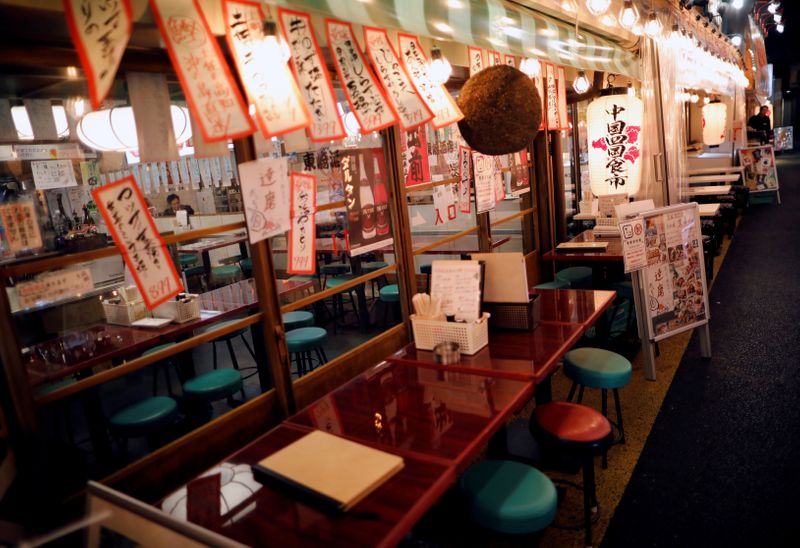By Kaori Kaneko
TOKYO (Reuters) - For someone like Sumako Furihata, who owns two small restaurants in Tokyo's Akasaka nightlife district, the coronavirus health crisis has been a nightmare that crushed sales and put her in a difficult situation.
Many of her rivals in the district, which relies on lunch and dinner demand from business workers, are also suffering as more companies have employees work from home at the government's request.
"The pace of fall in sales is much faster than during the global financial crisis," said Furihata, who has temporarily shut down one of her restaurants.
The pandemic has throttled an economy already on the brink of recession as social distancing policies have forced sectors such as transport, retail and tourism to temporarily scale down.
Economists say the outbreak also risked increasing deflationary pressure in Japan as people stay at home more and spend less.
"Prices for 'stay-at-home' related products such as foods are firm. But overall, there's an increasing risk Japan may slip back into deflation," said Hiroshi Ugai, chief economist at JPMorgan (NYSE:JPM) Securities Japan.
Ugai, who predicts Japan's economy will contract 4.4% this year, warned that prices for a range of goods will start falling around autumn.
An early snapshot of how Japanese businesses coped with the outbreak in March showed that retailers like Furihata were hit hardest, while other sectors got some respite.
The Nowcast private survey that captures real-time consumption trends – making it a leading indicator of government data – showed consumer spending index falling nearly 10% for hotels, about 28% for amusement parks, 14% for airplane tickets and more than 16% for train tickets during March 16-31, compared with a year earlier.
Many took a hit from the government's decision this month to declare a state of emergency for major population centres, including Tokyo, to combat the virus. The declaration urged citizens to stay at home, some facilities to shut down and restaurants to close early.
Movement of people around Tokyo station, a major transportation hub, dropped nearly 50% on April 15 from levels before the state of emergency announcement on April 7, according private data firm Agoop.
The number of people using major train stations such as Tokyo, Shinjuku and Ueno dropped more than 70% on April 13 from a year earlier, and that of western Osaka station slumped more than 60%, according to data compiled by the government.
There were some areas that were less affected, or even saw demand rise because of social distancing and work-from-home policies.
Coffee shops saw consumption increase more than 4% on demand from employees visiting cafes while teleworking.
Liquor shops saw spending rise 10% as bars closed. Supermarkets experienced more than a 14% rise in consumption, as they catered to households preparing more food at home.
But overall, prices are being pushed down.
(For graphics on consumption indexes by business category and overall, click: https://reut.rs/3erWOJ2, https://reut.rs/3bg2nYX )
Already, Japan is seeing bankruptcies creep up, particularly in the service sector. If the pandemic persists, the number could spike and lead to more job losses. That would dent the spending power of households, thus putting more downward pressure on prices, analysts say.
"If the number of unemployed rise, that will leave households with less purchasing power. That puts downward pressure on overall prices," said Takeshi Minami, chief economist at Norinchukin Research Institute.
Even if prices creep up, it could be for the wrong reasons. If the pandemic keeps factories in the world's third-largest economy from resuming operations for too long, that could hamper companies from producing enough goods.
"If companies need to scale down production lines for daily necessities, supply could shrink and prices of those produce may rise," Minami said.

(Interactive graphic tracking global spread of coronavirus: open https://tmsnrt.rs/3aIRuz7 in an external browser. )